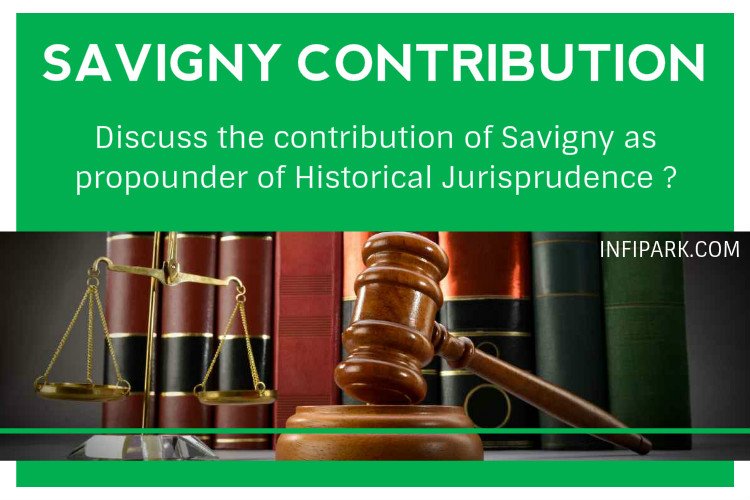The main tenets of Savigny’s theory can be summarised as follows :—
(1) Law has an unconscious organic growth, it is neither found nor artificially made.
(2) The basis of law is to be found in Volksgeist which means people’s Consciousness or will, and consists of traditions, customs, habits, practices and beliefs of the people.
(3) Law is not universal in nature but like language, it varies with people, time and needs of the community.
(4) Since law should always conform to popular consciousness i.e. Volksgeist, custom not only precedes legislation but is superior to it. “
(5) With the growing complexity of law, the popular conscious-ness is represented by lawyers who are nothing but the mouth-piece of the popular consciousness. It is for this reason that lawyers and jurists are more important than legislator in the process of development of a legdl system. [Freedmann : Legal Theory (5th Ed.) P. 21]
Criticism of Savigny’s Theory of Law
Savigny’s theory has been opposed by his critics on many grounds, the main among those are as follows :-
1. There are certain inconsistencies which are apparent in Savigny’s theory. He emphasised the national character of law but at the same time suggested a model by which Roman law could be adopted and accepted as the law of Germany. Again, he located origin of law in the Volksgeist, that is popular conscience but at the same time asserted that certain customary principles of Roman law had universal application Savigny’s undue importance on Roman law has been bitterly criticised by Eichhorn, Beselor and Gierke and it was because of their intervention in subsequent years that German Code was drafted.
2. It is often alleged that Savigny’s theory of law is negative obscure and suffers from narrow sectarian outlook. He was against codification of law which is one of the most accepted forms of modern progressive legislation. This anti-codification attitude of Savigny thwarted the growth of German law for several decades.
3. Savigny’s assertion that popular consciousness is the sole source of law is not wholly true. The theory of Volksgeist overlooks the impact of other sources of law such as legislation, precedent etc. in the evolution of law. There are many areas which would have been left without legal rules because there never existed any popular consciousness about them.
4. Again, Savigny’s view that customs are always based on the popular consciousness is also not acceptable. Many customs such as slavery, bonded labour etc. originated to accomplish the selfish interests of those who were in power. They are adopted because they are being blindly followed and continued for a long time and not because they are righteous and have the support of popular consciousness.
5. Roscoe Pound has criticised for his juristic passimism. Savigny’s theory hindered legal reforms and’ modernisation of law in the name of Volksgeist. Criticising savigny’s legal theory, Pound observed that no legal system would like to stick to the prevalent abuses and baneful customs only because people are accustomed to them. Savigny therefore, overlooked the creative role of law by introducing legal reforms. As Prof. Porkunove rightly pointed out, Savigny’s theory “does not determine the connection between what is national and what is universal.”.
6. Last but not the least, Savigny’s Volksgeist helped many nations to pervert it for promoting their own ideologies. Thus Nazi twisted it by giving a racial colour, the Marxists used it giving economic interpretation of history and Italy used it to justify fascism.
Savigny’s Contribution to Juristic Thought
Despite the above criticism, Savigny’s legal theory’ marks the beginning of modern jurisprudence. His theory of Volksgeist interpreted jurisprudence in terms of people’s will. Thus it paved the way to the modern sociological approach to law laying greater emphasis on relation of law with society, Savigny’s theory came as a reaction and revolt against the 18th century natural law theory and analytical positivism. The only defect in his theory was that he carried the doctrine of popular will too far.
The essence of Savigny’s Volksgeist was that a nation’s legal system is greatly influenced by the historical culture and traditions of the people and the growth of law is to be located in their popular acceptance. This laid the foundation of historical school of jurisprudence which was carried further by Sir Henry Maine, Vinodradoff, Lord Bryce and many “others. Ehrjich devised his theory of interest on the foundation laid down by Savigny. Savigny’s .approach to law also gave birth to comparative jurisprudence which has been accepted as one of the most important branches of legal studies in modern times. Maitland has supported Savigny’s approach to jurisprudence and pointed out that the course of development of common law in England was determined by socio-political conditions obtaining in England at that time.
Above all, Savigny’s legal theory served as a sound warning against hasty legislation and introduction of revolutionary abstract ideas in the legal system unless they mustered support of the popular will i.e. Volksgeist.








